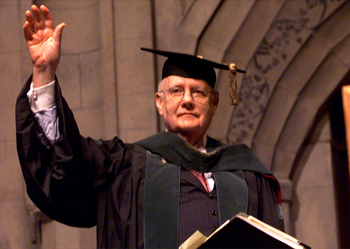
Dean John Chapman acknowledged the standing ovation he received upon his introduction at graduation in May, 2000. That year’s VUSM class was the last to receive its degrees from Chapman.
photo by Dana Johnson
Watkins lecturer Hayes seeks public health boost
Maxine Hayes, M.D., said that when she completed her residency at Vanderbilt she knew “the place will never be the same again.” Tuesday during the third annual Levi Watkins Jr. Lecture on Diversity in Medical Education, the former resident and Vanderbilt's first African-American resident concluded that “it's never been.”
Hayes, state health officer for the Washington State Department of Health, told the audience she found her inspiration for a career in public health at Vanderbilt three decades ago, at Amos Christie's recommendation. During her presentation, “The Future of Public Health,” Hayes sought to share that inspiration.
She pointed to a quote from Harvard's president, Lawrence Summers. “There is no other area of human endeavor in which the application of thought and resources can make so profound a difference in as many peoples' lives as in the work of public health.” This quote, she said, couldn't be truer.
“Day by day, every state, every community is carrying out the public health mission — assuring the health of the nation,” she said. Then she pointed to the many challenges facing the field, such as the mission to ensure the health and safety of the nation, the aging population, and the pandemic of obesity. “But,” Hayes said, “I don't ever think of challenges without thinking about opportunities.”
The opportunity, she said, is changing the face of public health. Namely, holding countries of the world accountable for the health of their people, and in the United States, eliminating health disparities. This, Hayes said, requires a new mindset, because “you cannot achieve what you cannot envision.”
“It was Martin Luther King Jr. who said that of all the inequalities, the inequality in health is the most inhumane,” Hayes said. She said inequality goes beyond access to care, because access only determines 10 percent of health. The main goal is to change social conditions because “social determinants truly affect health,” Hayes said.
She said public health's next step is to educate policy makers and health professionals, clarify the role government can play, find partners and take action.
The Levi Watkins Jr. Lecture on Diversity in Medical Education is an annual event named after the first African-American student to enter and graduate from VUMS.
Watkins also has a professorship in his name, which is held by George C. Hill, Ph.D., dean of Diversity, as well as an annual award for faculty or administrators who have fostered the opportunities for underrepresented minorities at Vanderbilt. This year's award recipients were Gerald S. Gotterer, M.D., Ph.D., senior associate dean for Faculty and Academic Administrative Affairs, and Agnes Fogo, M.D., professor of Pathology, Pediatrics and Medicine.













